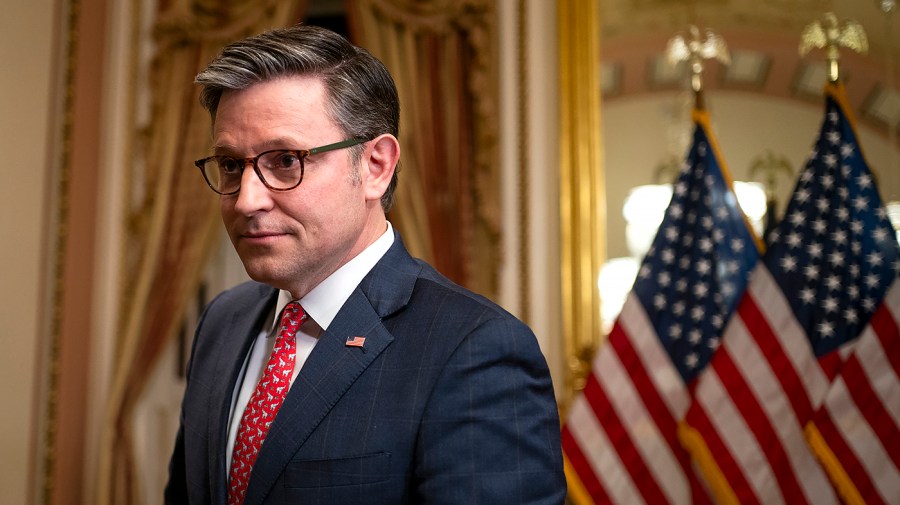
Speaker Mike Johnson (R-La.) is urging the House Ethics Committee to not release its investigation into former Rep. Matt Gaetz (R-Fla.), as pressure mounts on the panel to publish its findings about the Florida Republican who resigned from Congress immediately after President-elect Trump selected him to be attorney general.
“I do not, no,” Johnson told CNN and Politico reporters when asked if the panel should release its findings about Gaetz. “I think it’s a terrible breach of protocol and tradition and the spirit of the rule.”
“I’m going to strongly request the Ethics Committee not issue the report because that is not how we do things in the House and I think that would be a terrible precedent to set.”
The Speaker said he planned to talk to House Ethics Committee Chair Michael Guest (R-Miss.) about the matter.
Johnson later warned that issuing the report after Gaetz resigned Wednesday — and thus removed himself from the committee’s jurisdiction — would “open a Pandora’s box.”
Johnson’s lobbying for Gaetz is a striking break from the hands-off way House leaders have typically approached issues before the Ethics Committee in the past — and from what Johnson had said about the issues just two days prior.
“As far as the timing of a release report or something, I don’t know. The Speaker of the House is not involved in that — can’t be involved in that,” Johnson said Wednesday, shortly after he announced Gaetz had resigned from the House.
The Speaker argued Friday that the “House’s tradition” on the matter is the panel not issuing reports after members leave the chamber. That move, however, is not entirely unprecedented; in 1987, the panel released its report into former Rep. William Boner (D-Tenn.) after he resigned from the House.
Asked about that example, Johnson said it reflected precedent being broken.
“I believe it is very important to maintain the House’s tradition of not issuing Ethics reports on people who are no longer members of Congress,” the Speaker said. “I think it would open a Pandora’s box. It’s a very important rule that should be maintained — if it’s been broken once or twice, it should not have been.”
“If someone is no longer a member of Congress, we’re not in the business of investigating and publishing a report of people who are not in this institution,” he later added.
Former Speaker Kevin McCarthy (R-Calif.) has repeatedly said Gaetz forced a vote to oust him because he refused to get involved in the Ethics Committee investigation. Gaetz denied that, citing strategy and policy disagreements as why he led the charge to remove the Californian.
The Ethics panel has for years been investigating Gaetz, exploring whether he engaged in sexual misconduct and illicit drug use, among other allegations. He has vigorously denied allegations of wrongdoing, and the Department of Justice, which previously investigated whether he had sex with a 17-year-old, declined to charge him with a crime.
That Ethics Committee investigation, however, came to an abrupt end Wednesday, when Gaetz resigned from the House shortly after Trump nominated him to serve as attorney general. The Ethics panel does not have jurisdiction over former members of Congress.
Johnson declined to say if he has spoken with Trump about his stance on the release of the report.
“I’m not talking to anybody about what I said to Trump,” the Speaker said.
It remains unknown what path the panel will follow with its Gaetz report. The committee was initially scheduled to meet Friday to vote on whether to publish its findings — a vote that had been on the calendar before Wednesday’s developments — but the huddle was later canceled, two sources told The Hill.
It remains unclear when the panel will meet next.
“It’s very fluid,” one of the sources said.
Johnson said Gaetz abruptly resigned his seat in order to quickly start the process of electing a replacement and lessen his departure’s impacts of the slim majority. Lawmakers have speculated Gaetz resigned his seat in an attempt to keep the report from coming out.
Senators in both parties have said they want to see the Ethics panel’s findings before voting on his confirmation to the Cabinet position.

